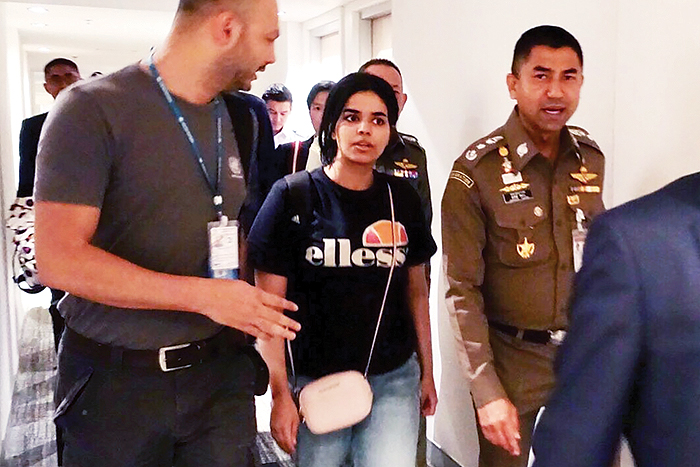
BANGKOK: The Saudi woman who made a desperate plea for asylum after landing at Bangkok airport has been placed "under the care" of the United Nations refugee agency, a Thai official said late yesterday. Rahaf Mohammed Al-Qunun told AFP she ran away from her family while travelling in Kuwait because they subjected her to physical and psychological abuse. The 18-year-old said she had planned to seek asylum in Australia and feared she would be killed if repatriated by Thai immigration officials who stopped her during transit on Sunday.
Thai immigration chief Surachate Hakparn had said Sunday that Qunun was denied entry because of her lack of documents. But he made an abrupt about-face the next day, following a global media frenzy as the young woman pleaded on Twitter for different countries to help her. After announcing that Thailand "will not force her" to leave, Surachate told reporters late yesterday that Qunun would be "allowed to stay" after a meeting with officials from the UN refugee agency UNHCR.
"She is under the care of the UNHCR now but we also sent Thai security to help take care (of her)," Surachate told reporters at Suvarnabhumi airport. He said Qunun had told UNHCR officials she "wants to stay in Thailand for a while seeking asylum to a third country". The agency "will take five days to consider her status" and another five days to arrange for travel, Surachate said, adding that he would meet with Saudi diplomats today to explain Thailand's decision.
Following the announcement, a relieved Qunun tweeted that she felt safe "under UNHCR protection with the agreement of Thailand authorities", adding that her passport had been returned to her after being taken away on Sunday. UNHCR's spokesman in Geneva Babar Baloch confirmed Qunun had "left the airport to a safe place in the city" and said agency officials would interview her once she had had some rest.
Surachate had told reporters earlier yesterday Qunun was stopped by immigration because Saudi officials had contacted them to say she had fled her family. "Thailand is a land of smiles. We will not send anyone to die," he said. "We will take care of her as best as we can." Qunun had earlier posted a video on Twitter of her barricading her hotel room door with furniture in a bid to stop her deportation from Thailand.
She said Saudi and Kuwaiti officials had taken her passport from her when she landed - a claim backed by Phil Robertson, deputy Asia director at Human Rights Watch. Abdulilah Al-Shouaibi, charge d'affaires at the Saudi embassy in Bangkok, told Saudi-owned TV channel Khalijia that the woman's father - a senior regional government official - had contacted the diplomatic mission for "help" bringing her back. But he denied that her passport had been seized and that embassy officials were present inside the airport. A Twitter statement from the Saudi embassy in Bangkok said Qunun was stopped by Thai authorities for "violating the law".
The ultraconservative Saudi kingdom has long been criticized for imposing some of the world's toughest restrictions on women. That includes a guardianship system that allows men to exercise arbitrary authority to make decisions on behalf of their female relatives. In addition to facing punishment for "moral" crimes, women can also become the target of "honor killings" at the hands of their families, activists say.
If sent back, Qunun told AFP she would likely be imprisoned and was "sure 100 percent" her family would kill her. "My family is strict and locked me in a room for six months just for cutting my hair," she said. She told Reuters via text and audio messages she had fled Kuwait during a family visit there, and had planned to travel to Australia to seek asylum. She said she was held after leaving her plane in Bangkok and told she would be sent back to Kuwait. "They will kill me," Qunun told Reuters. "My life is in danger. My family threatens to kill me for the most trivial things."
Qunun said her family was powerful in Saudi society but she did not identify them. Asked why she was seeking refuge in Australia, she told Reuters: "Physical, emotional and verbal abuse and being imprisoned inside the house for months. They threaten to kill me and prevent me from continuing my education. They won't let me drive or travel. I am oppressed. I love life and work and I am very ambitious but my family is preventing me from living."
Qunun said she had obtained an Australian visa and booked a flight. She said she had planned to spend a few days in Thailand so she would not spark suspicion when she left Kuwait. Surachate, however, said that Qunun did not have a visa for Australia. The Australian Embassy said it had no immediate comment.
HRW's Robertson said Qunun "faces grave harm if she is forced back to Saudi Arabia". "Given Saudi Arabia's long track record of looking the other way in so-called honor violence incidents, her worry that she could be killed if returned cannot be ignored," he said. "She has clearly stated that she has renounced Islam which also puts her at serious risk of prosecution by the Saudi Arabian government."
An Australian government spokesman said the claims made by Qunun "that she may be harmed if returned to Saudi Arabia are deeply concerning" and they are monitoring the case "closely". Australian embassy representatives in Bangkok have reached out to Thai authorities and the UNHCR to "seek assurances" that she will be able to access the "refugee status determination process". The UNHCR said that according to the principle of non-refoulement, asylum seekers cannot be returned to their country of origin if their life is under threat. - Agencies










